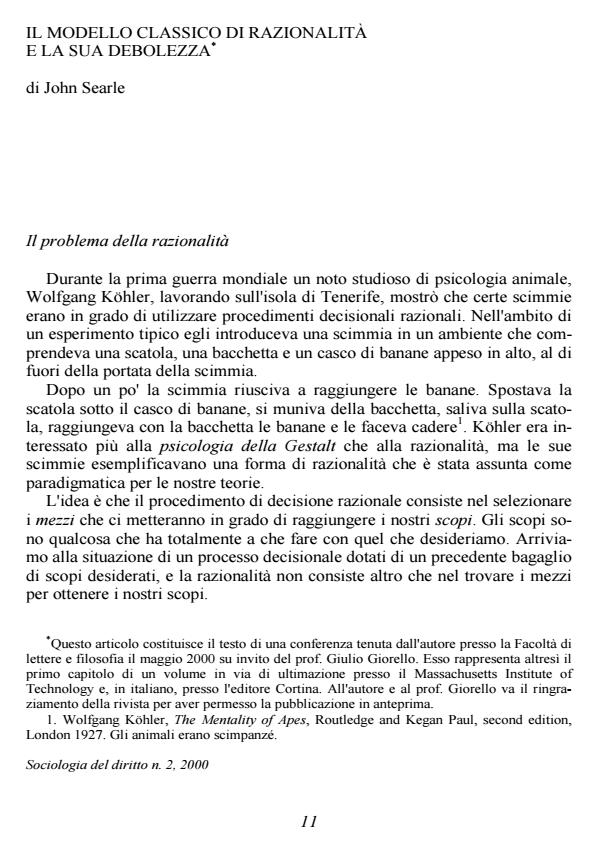Il modello classico di razionalità e la sua debolezza
Titolo Rivista SOCIOLOGIA DEL DIRITTO
Autori/Curatori John R. Searle
Anno di pubblicazione 1 Fascicolo 2000/2 Lingua Italiano
Numero pagine 24 P. Dimensione file 114 KB
DOI
Il DOI è il codice a barre della proprietà intellettuale: per saperne di più
clicca qui
Qui sotto puoi vedere in anteprima la prima pagina di questo articolo.
Se questo articolo ti interessa, lo puoi acquistare (e scaricare in formato pdf) seguendo le facili indicazioni per acquistare il download credit. Acquista Download Credits per scaricare questo Articolo in formato PDF

FrancoAngeli è membro della Publishers International Linking Association, Inc (PILA)associazione indipendente e non profit per facilitare (attraverso i servizi tecnologici implementati da CrossRef.org) l’accesso degli studiosi ai contenuti digitali nelle pubblicazioni professionali e scientifiche
After devoting most of his philosophical attention to problems of the philosophy of language and the philosophy of the mind, John Searle has recently turned to the study of the social dimension of human activity, the premise and condition for the scale of the mind and of language. Evidence of this new direction in his interests is found in the books he has written in recent years, The Construction of Social Reality (1995) and Mind, Language and Society: Philosophy in the Real World (1999), both of which are available in Italian translations. This article is the Italian translation of the first chapter of another book, soon to be published (by MIT Press) and entitled On Rationality. As well, it corresponds to the text of a speech given by the author in Milan University in May, 2000. Searle embarks on his discussion of rationality with a radical critique of what he calls the classical model of rationality, exemplified in practice by the rational human decision-making process that consists of choosing the best way of achieving one's ends. There is a formalised paradigm of this model in the mathematical model of the theory of rational decisions. According to the American philosopher, the classical theory of rationality is based (more or less implicitly) on six principles: a) rational actions are caused by desires and beliefs; b) acting rationally means acting in conformity with given rules; c) rationality is a specific cognitive faculty; d) presumed cases of weak will, or akrasía (in the terminology of classical Greek philosophy), are caused by something being wrong in the conditions that precede an action; e) practical reasoning begins with the contemplation of primary aims (ends, wishes, objectives, fundamental intentions) that are not subject to the limits of rationality; f) a global rational system only works if the corresponding set of primary wishes upstream of it is coherent. Searle deploys a serried rank of objections to each of these principles.;
John R. Searle, Il modello classico di razionalità e la sua debolezza in "SOCIOLOGIA DEL DIRITTO " 2/2000, pp , DOI: